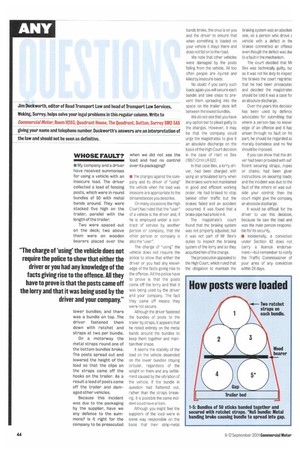WHOSE FAULT?
Page 44

If you've noticed an error in this article please click here to report it so we can fix it.
• My company and a driver have received summonses for using a vehicle with an insecure load. The driver collected a load of fencing posts, which were in round bundles of 50 with metal bands around. They were stacked five high on the trailer, parallel with the length of the trailer.
Two were spaced out on the deck; two above them were on wooden bearers placed over the lower bundles; and there was a bundle an top. The driver fastened them down with ratchet and straps at two per bundle.
On a motorway the metal straps round one of the bottom bundles broke. The posts spread out and lowered the height of the load so that the clips on the straps came off the hooks on the trailer. As a result a load of posts came off the trailer and damaged other vehicles.
Because this Incident was due to the packaging by the supplier, have we any defence to the summons? Is it right for the company to be prosecuted when we did not see the load and had no control over its packaging?
• The charges against the company and its driver of "using" the vehicle when the load was insecure are appropriate to the circumstances you describe.
On many occasions the High Court has ruled that the "user" of a vehicle is the driver and, if he is employed under a contract of service by another person or company, that the other person or company is also the "user".
The charge of "using" the vehicle does not require the police to show that either the driver or you had any knowledge of the facts giving rise to the offence. All the police have to prove is that the posts came off the lorry and that it was being used by the driver and your company. The fact they came off means they were not secure.
Although you might feel the suppliers of the load were in some way responsible on the basis that their strip-metal Although the driver fastened the bundles of posts to the trailer by straps, it appears that he relied entirely on the metal bands around the bundles to keep them together and maintain their shape.
It seems the stability of the load on the vehicle depended on the lower bundles staying circular, regardless of the weight on them and any settlement caused by the vibration of the vehicle. If the bundle in question had flattened out, rather than the straps breaking, it is possible the same incident could have arisen. bands broke, the onus is on you and the driver to ensure that when something is loaded on your vehicle it stays there and does not fall on to the road.
We rote that other vehicles were damaged by the posts falling from the vehicle. All too often people are hured and killed by insecure loads.
No doubt if you carry such loads again you will secure each bundle and take steps to prevent them spreading into the space on the trailer deck left between the lowest bundles.
We do not see that you have any option but to plead guilty to the charges. However, it may be that the company could urge the magistrates to give it an absolute discharge or the basis of the High Court decision in the case of Hart vs Sex (1957) Crirn [8 622.
In that case Bex, a lorry driver, had been charged with using an articulated lorry when the brakes were not maintained in good and efficient working order, He had braked to stop behind other traffic but the brakes failed and an accident occurred. It was found that a brake pipe had a hole in it.
The magistrate's court found that the braking system was not properly adjusted, but it was not part of Mr Sex's duties to inspect the braking system of the lorry and so they acquitted him of the charge, The prosecution appealed to the High Court, which ruled that the obligation to maintain the braking system was an absolutE one, so a person who drove vehicle with a defect in thE brakes committed an offencE even though the defect was duE to a fault in the mechanism.
The court decided that Mr Bex was technically guilty, bui as it was not his duty to inspeci the brakes the court regrettec that he had been prosecutec and decided the magistrates should be told it was a case for an absolute discharge.
Over the years this decisior has been used by defence advocates for submitting thal where a person has no knowledge of an offence and A hac arisen through DO fault on his part, he should be regarded as morally blameless and no fins should be imposed.
If you can show that the driver had been provided with sufficient securing straps, ropes or chains; had been giver instructions on securing bads; and the incident was due to the fault of the others or was outside your control; then the court might give the company an absolute discharge.
It would be difficult for the driver to use this decision, because he saw the load and was the main person responsible for its security.
• Incidentally, a conviction under Section 42 does not carry a licence endorsement—but remember to notify the Traffic Commissioner of your area of any conviction within 28 days.




































































































































